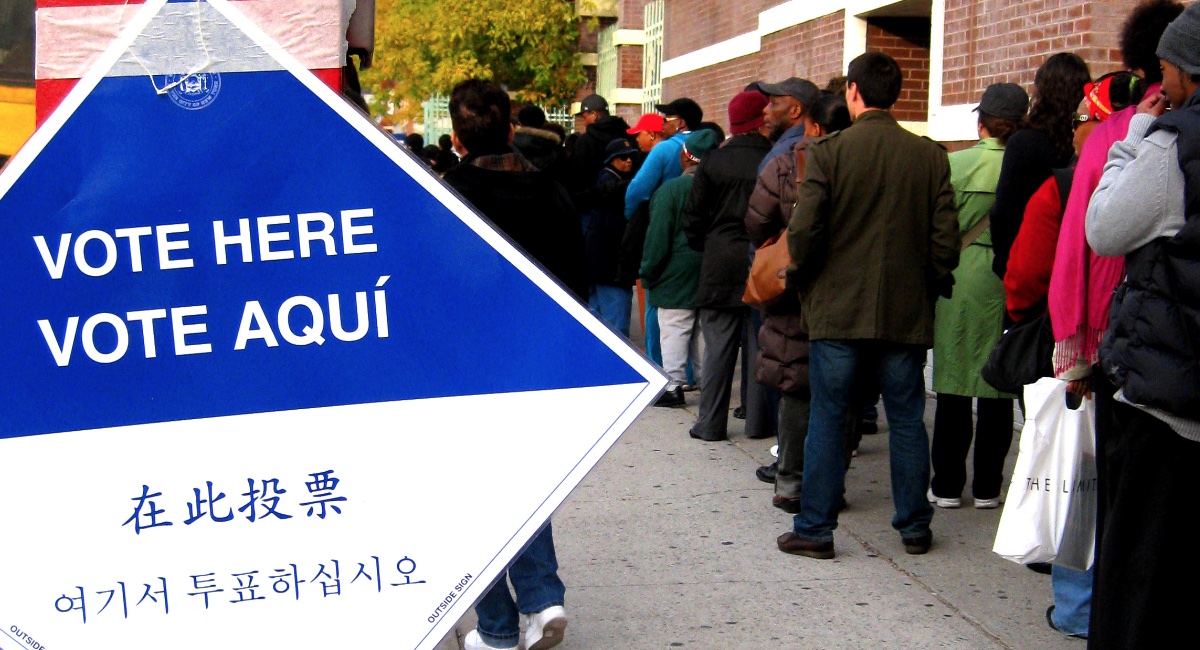In the 10 years since the John Roberts-led Supreme Court gutted the 1965 Voting Rights Act, states in the Deep South have been working furiously to strip non-white citizens’ voting rights.
A recent report from the Southern Poverty Law Center details some of the effects of that 2013 case, Shelby v. Holder.
The ruling, in favor of Shelby County, Alabama, ended the VRA’s rules that jurisdictions with a history of racist voting policies had to get “preclearance” from the U.S. Attorney General – in this case, Eric Holder – or a panel of federal judges before making any changes in how they ran elections.
Six states were originally subject to that requirement – Louisiana, Mississippi, Alabama, Georgia, South Carolina and Virginia – plus 39 counties in North Carolina and one in Arizona. Those determinations were based on voter registrations or turnout of less than 50% in the preceding presidential election, or discriminatory practices such as voting eligibility “tests.”
From its passing in 1965, Congress continued to adjust and reauthorize the law – for instance, barring English-only election materials if 5% of the population primarily used another language – until 2006, when it passed a 25-year extension, until 2031, with a unanimous vote in the Senate.
But the Court’s 2013 decision in favor of Alabama’s Shelby County, based on Roberts’ reasoning that the almost 50-year-old legislation had been so successful in stopping vote suppression that it could be set aside, unleashed a torrent of examples of why that wasn’t so.
Disenfranchising Black voters
“From the end of slavery to present day, significant advancements in Black political participation and representation have often been followed by a swift backlash and retrenchment of rights,” the SPLC report states.
“It happened after Reconstruction. It happened after the election of the nation’s first Black president. And it is happening today as we stand at a critical moment where our democracy is under attack on many fronts after the decade-long erosion of BIPOC voter access – namely, Black voter access – sparked by the Shelby County decision.”
Out of more than a half-million proposed voting law changes submitted by jurisdictions subject to the preclearance rule between 1965 and 2013, the Department of Justice had blocked more than 3,000 as discriminatory.
On the day after the Shelby ruling was announced, Alabama enacted a restrictive photo ID rule, the report notes, and as of March this year, 35 other states now have voter ID rules too.
Alabama’s secretary of state reported in 2014 that about 20% of its registered voters didn’t have a driver’s license or non-driver ID, and half of those 500,000 people didn’t have anything else that would satisfy the new requirement.
In 2015, the state moved to close 31 driver’s license offices in Black population centers.
When Georgia passed its voter ID law, of the 273,000 registered voters without the license or ID it required, more than half were Black and living in Democratic Party-leaning counties.
When North Carolina’s voter ID law was disallowed by an appeals court in 2016, it noted that the law targeted Black voters “with almost surgical precision.”
Closing polling stations & purging voter rolls
Another vote suppression tactic has to do with polling places. Overall, states previously covered by the preclearance rule closed 1,688 between 2012 and 2018. In Florida, after a hurricane, Lee County reduced almost 100 polling locations, predominantly in Black communities, to a dozen “super sites.”
Added to that was a lack of outreach and communication about the changes. In one Mississippi case involving almost 100 polling place changes between 2020 and 2022, even the state database for voter information failed to provide the necessary updates.
Another vote suppression tactic, voter roll purging, also caught on, particularly after the Court’s Husted v. A. Philip Randolph Institute ruling in 2018. But already, a Brennan Center analysis found, jurisdictions no longer subject to preclearance purged 2 million more voters in 2016 than they would have if their purges had happened at the same rate as states that never faced preclearance requirements.
Georgia’s then-Secretary of State Brian Kemp defeated Stacey Abrams by 54,723 votes to become governor in 2018. On his way to the governor’s mansion, his unrestricted changes to polling places, the Atlanta Journal Constitution found, likely kept between 54,000 and 85,000 voters away on Election Day.
But on top of that, he also purged more than a half-million people from the state’s voter registration rolls – including 107,000 in one day because they hadn’t voted in prior elections.
Court cases that cited the preclearance rules limited Florida’s efforts to purge 182,000 people from the rolls to 2,600 in 2012, the SPLC report notes. But whereas the state was purging voters at a rate of 0.2% between 2008 and 2010, that rate grew to more than 7% between 2016 and 2018, according to a Brennan Center finding it cites.
There’s more. The SPLC has also published a timeline synopsis of voting changes since Shelby v. Holder. Among them: Florida and other states implementing new barriers to voting by the formerly incarcerated, in defiance of the expressed will of voters; new limits on early voting, assisting voters in accessing absentee ballots, supporting those waiting in long lines at polling places, eliminating Sunday voting and more.
“In a glimmer of hope,” the SPLC pointed out, “the COVID-19 pandemic provided an opportunity to make voting more accessible in light of social distancing restrictions, with states across the nation exploring novel methods to protect access to the vote,” leading to the highest voter turnout this century.
“Where there is political will, change can occur,” it said.




